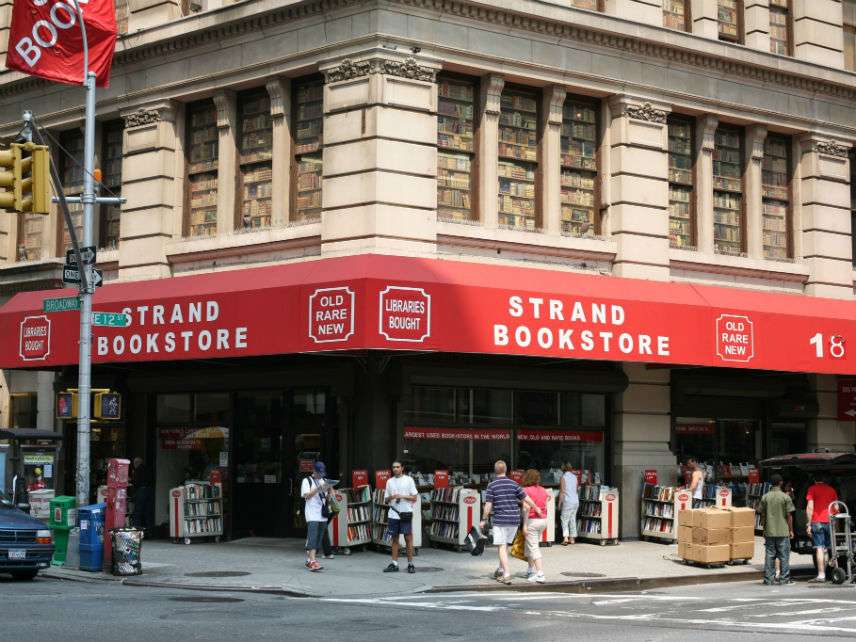Strand Bookstore Owner Says NYC's Efforts to Preserve Her Building Could Doom It
"I'm not asking for money or a tax rebate," says Nancy Bass Wyden. "Just leave me alone."

The owner of the famous Strand Bookstore in Manhattan doesn't want the city's help preserving her building. She doesn't want tax breaks or government subsidies. She just wants to be left alone.
But the city may have other ideas. Nancy Bass Wyden was set to attend a public hearing today before NYC's Landmarks Preservation Committee (LPC). In September, the commission agreed to begin the process of designating the Strand and six other area buildings as historic landmarks. Later, the LPC's Research Department issued a designation report calling the Strand "a center of literary life in Lower Manhattan" and "an internationally recognized bookstore and destination," according to The New York Times. The building is also notable for its architectural style and for the fact that renowned architect William H. Birkmire helped design it, the report said.
So why doesn't Wyden want her building, which is worth roughly $31 million, to be designated a historic landmark? It's simple. The Times reports:
Like many building owners in New York, Ms. Wyden argues that the increased restrictions and regulations required of landmarked buildings can be cumbersome and drive up renovation and maintenance costs.
"By landmarking the Strand, you can also destroy a piece of New York history," she said. "We're operating on very thin margins here, and this would just cost us a lot more, with this landmarking, and be a lot more hassle."
Wyden has the support of multiple prominent writers. But some people say she has no reason to be worried. "No one is doing this to hurt the Strand, or add difficulties," Peg Green, president of the advocacy group New York Landmarks Conservancy, told the Times. "They're doing it to honor the building."
That doesn't quite tell the whole story. The effort to "preserve" the Strand and nearby buildings was sparked by the announcement last year that a 258,000-square-foot tech-focused building would replace an old P.C. Richard & Son in the area. Preservation groups were not happy, believing more development projects would soon follow. Led by the Greenwich Village Society for Historic Preservation, activists asked the LPC to designate nearly 200 buildings as historic landmarks.
The LPC decided to move forward on just seven of those buildings. One of those was the Strand, despite the fact that Wyden does not plan on selling the building to a developer.
The LPC is considering designating one of the oldest and most famous traditional book stores in the world as a historic landmark around the same time that Amazon—which has come to dominate the book-selling industry—announced it was opening a new headquarters in Queens. As Reason's Eric Boehm noted earlier this month, Amazon is receiving $1.2 billion in refundable tax credits, as well as a cash grant of $325 million. In total, the state pledged more than $1.52 billion for 25,000 jobs.
Meanwhile Wyden, who employs 230 people at the Strand, doesn't want any help from the government. "I'm not asking for money or a tax rebate," she told the Times. "Just leave me alone."
Wyden is right to be wary of the city's efforts. While historic landmark designations supposedly help preserve old buildings, their main goal is often to stop the development of new buildings. That seems to be what's happening in this case. It's a relatively common phenomenon; Reason's Christian Britschgi has pointed out two egregious examples just this year.
A San Francisco man, for instance, wanted to develop his single-story laundromat into a 75-unit apartment building. But concerned neighbors pressured the city to make Robert Tillman's life difficult. Among other objections, the city's Planning Department said his property might be a "historic resource." It was a ridiculous claim, based on the fact that his property housed a local employment agency in the 1970s and that it used to feature a mural depicting the life of Latina women. Tillman had to pay $23,000 for a report that proved his property was not a historic resource, only for the city to ask him to perform another study, this one related to the effects of his proposed apartment building's shadow on a nearby school.
In Seattle, strip club magnate Roger Forbes wanted to redevelop a property he owns from a famed music venue called the Showbox to an apartment building. The city had already deemed the Showbox unworthy of historic protection numerous times in the past, but after supporters and local musicians complained over Forbes' plans, the city council passed emergency legislation to include the Showbox in a nearby historical district.
The Strand, meanwhile, isn't a historic landmark yet. However the Times notes that most buildings considered by the LPC are approved as landmarks. In the end, Wyden's protests might not end up mattering.
That's wrong, of course. The Strand doesn't belong to the city—its Wyden's property. And she clearly plans to take care of it so customers keep coming in. Hopefully, the city's efforts won't doom the family business.
Bonus link: In 1965, NYC Mayor Robert F. Wagner Jr. signed the Landmarks Preservation Law. Here's how that legislation bulldozed the future:


Show Comments (24)